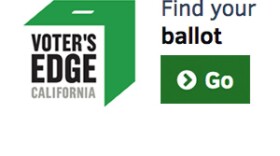If opponents of judicial elections were arguing in court, they might use the case of Ken Gosselin to make their point.
Gosselin is a lawyer running against Deputy Attorney General Brad Weinreb for an open seat on the San Diego Superior Court. The election is Nov. 4.
Earlier this year, Gosselin told voters he was a Harvard-trained attorney. He actually earned his law degree from the University of La Verne. Gosselin also stated he was a constitutional lawyer when his specialty is real estate.
Gosselin claimed in his candidate statement he had presided over thousands of criminal and civil cases as a volunteer judge. But volunteer judges like Gosselin are limited to traffic and small claims cases. A judge later ordered Gosselin to change the language in his candidate statement.
He did not respond in time to comment for this story, but in the past he has called these issues “misunderstandings.”
There’s also the issue of Gosselin’s campaign signs. Before the June primary, to the casual onlooker, his signs incorrectly portrayed him as an incumbent judge.
Gosselin’s lawyer, John Franklin, has said good campaign signs convey only the most critical concepts.
Retired California Court of Appeal Justice Howard Wiener, however, called Gosselin’s signs outrageous.
“That’s the kind of abuse where one’s blood boils,” Wiener said. “That shouldn’t happen. It’s simply wrong.”
Judges exert enormous power over people’s lives. They decide a person’s freedom. They can fine a corporation millions of dollars for misconduct. And they rule on how much time children spend with their parents in custody cases.
Gosselin’s campaign has raised questions over whether judges should be getting mixed up in politics by running for election in the first place.
“The real dilemma here is you don’t want judges to be completely unaccountable,” said Glenn Smith, a constitutional law professor at California Western School of Law.
Smith advocates appointing trial court judges initially, a process he said is also not devoid of politics. But appointments at least require a thorough vetting of a candidate. Smith supports retention elections after the first term. If the incumbent gets a majority of no votes, then the judge should stand for a contested election, he said.
“When you have judicial candidates appealing directly to voters, you run the risk that all of the problems with other elections will come into play,” Smith said.
Those problems include false or misleading claims, negative advertising and raising money from special interest groups. Lawyers and well-heeled companies with potential cases before judges up for re-election may feel compelled to contribute to their campaigns. Smith said it’s a cycle that undermines the impartiality of courts.
“It’s one thing if you think campaign contributions are buying access to a member of Congress or a senator, because we expect there to be a certain amount of political favoritism. But our whole notion that justice is not about that kind of favoritism is at risk,” Smith said.
Another issue with judicial elections is incumbent judges can be challenged based on a single decision that angers someone. In 1994, that happened to San Diego Superior Court Judge Anthony Joseph, who is now retired.
“I had a case that involved the Boy Scouts and one of their troop leaders,” Joseph said. “He was gay. The Boy Scouts were disciplining him and I found that was not legal, and I drew a candidate based on that decision. It’s not fun being run against.”
Joseph ultimately defeated his challenger.
Retired Justice Wiener calls judicial elections imperfect but necessary, if not to throw out bad judges, at least to rehabilitate them.
“It’s a wonderful opportunity to learn about what he or she may have done incorrectly to improve,” Wiener said. “Now if the judge has the personality that 'I’ve done nothing wrong, they’re picking on me, it’s been a waste of time,' maybe that candidate should lose if there is a better qualified candidate.”
Wiener said elections also serve to temper the arrogance that can come from too much time on the bench.
“I haven’t seen increasing humility over the years when one is a judge,” Wiener said. “When you grade your own papers, and people stand up when you walk in the room and they laugh at your jokes all the time, it’s easy to think you’re pretty smart and pretty important.”
So it falls to voters to keep judges accountable, but that’s a tall order for busy citizens, constitutional law professor Smith said.
“Elections are the best way we know in our American democracy to hold people accountable,” Smith said. “I understand the theory. I think it would be great if we had an informed electorate who had a way to figure out which of these candidates is the best judge. But that’s not the system we have.”
Smith, Wiener and Joseph all said they’re inundated with calls from friends about which judges they should vote for at election time.
The San Diego County Bar Association helps by evaluating judicial candidates. The group has weighed in on the only contested judicial election next month. Candidate Gosselin was deemed lacking in qualifications. His opponent, state prosecutor Weinreb, was rated qualified.







